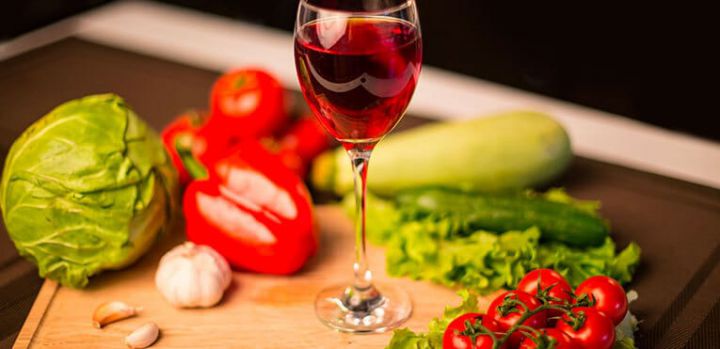Choosing a vegetarian wine to match the flavours of vegetables, cereals and legumes is essential to enhance a vegetarian meal. Contrary to popular belief, vegetarian food and wine pairings offer a wide range of options.
Why choose a vegetarian wine?

A vegetarian wine contains no animal products. In traditional winemaking, some wineries use clarifying agents such as egg albumin or gelatin. Fortunately, many plant-based alternatives exist.
Why choose a vegetarian wine?
- Respect for ethical and nutritional values.
- More natural, environmentally-friendly production.
- Preserved aromas and wine authenticity.
A good choice of vegan-certified organic wine guarantees vinification without animal products.
The principles of vegetarian food and wine pairing
Vegetables, legumes and cereals offer a wide variety of flavors. Wine should complement these textures and aromas without dominating them.
- Acidity balances dishes rich in green vegetables.
- Tannins soften vegetable proteins (mushrooms, lentils, tofu).
- The residual sugar enhances the spicy, sweet-savory flavors.
By following these principles, you'll find the perfect vegetarian wine for every dish.
White wines: freshness and finesse
1. Sauvignon Blanc: liveliness and minerality
This variety is perfect for light, herbaceous dishes.
- Caractéristiques: Dry, lively, with notes of citrus and blackcurrant buds.
- Perfect with: green salads, asparagus, hummus, tabbouleh.
2. Riesling: balance between acidity and sweetness
A dry or semi-dry Riesling is ideal for Asian and spicy cuisine.
- Characteristics: Floral, mineral notes, light sweetness.
- Perfect with: Vegetable curry, pad thai, sweet and sour dishes.
3. Unwooded Chardonnay: roundness and elegance
A Chardonnay aged in stainless steel vats brings harmony to creamy dishes.
- Caractéristiques: Notes of apple, pear and white flowers.
- Perfect with: Mushroom risotto, zucchini gratin, marinated tofu.
Light red wines: supple and delicious
1. Pinot Noir: delicacy and finesse
This grape variety with its light tannins is the perfect accompaniment to vegetarian dishes.
- Caractéristiques: Notes of cherry, raspberry, sweet spices.
- Perfect with: Vegetable pies, grilled mushrooms, stuffed eggplant.
2. Gamay: fruity and accessible
Beaujolais and other Gamays are perfect for gourmet vegetarian dishes.
- Caractéristiques: Freshness, notes of red berries.
- Perfect with: Ratatouille, spiced lentils, vegetarian burgers.
3. Cinsault: a light, floral red
This Mediterranean variety brings suppleness and fruity aromas.
- Caractéristiques: Notes of strawberry, violet and sweet spices.
- Ideal with: Vegetarian couscous, spicy dishes, stewed chickpeas.
Rosé wines: freshness and balance
1. Côtes de Provence: the versatile rosé
Ideal for a Mediterranean summer meal.
- Caractéristiques: Dry, with notes of citrus and red fruit.
- Perfect with: Bruschettas, mixed salads, grilled vegetables.
2. Tavel: a fuller-bodied rosé
Perfect with richer vegetarian dishes.
- Caractéristiques: Intense color, notes of strawberry and spices.
- Ideal with: Sautéed root vegetables, mushroom quiches.
Sparkling wines: a festive touch
1. Champagne brut nature: finesse and elegance
A low-bodied champagne goes well with vegetarian appetizers.
- Caractéristiques: Fine bubbles, notes of brioche and lemon.
- Perfect with: Vegetarian sushi, cheese appetizers.
2. Crémant de Loire: a fine alternative
An organic crémant can be an excellent option for a festive meal.
- Caractéristiques: Floral notes, light bubbles.
- Perfect with: vegetable tempura, savoury cakes.
3. Natural sparkling (Pét-Nat): original and natural
This natural sparkling wine will appeal to connoisseurs of lively wines.
- Caractéristiques: Light effervescence, fruity aromas.
- Ideal with: Vegetarian aperitifs, spicy dishes.
Vegetarian food and wine pairings for different dishes
1. Light dishes and salads
- Dry white wine: Sauvignon Blanc, Muscadet.
- Light rosé: Côtes de Provence.
2. Spicy and exotic dishes
- Aromatic white wine: Gewurztraminer, Viognier.
- Light red wine: Gamay, Pinot Noir.
3. Creamy dishes and gratins
- Round white wine: Chardonnay, Chenin blanc.
- Soft red wine: Cinsault, Grenache.
4. Simmered, umami-rich dishes
- Fruity red wine: Beaujolais, light Syrah.
- Sparkling wine: Pét-Nat, Crémant de Loire.
Vegetarian wine trends and novelties
- Natural wines: Increasingly popular for their input-free production.
- Orange wines: Macerated with the grape skins, they offer great complexity.
- Sulfite-free wines: An alternative for lovers of lively wines.
How to choose the right vegetarian wine?
- Look for labels (Vegan, Organic, Demeter) to guarantee animal-free production.
- Choose well-balanced, fresh wines to accompany a variety of dishes.
- Try out different styles to find your preferences for the dishes you enjoy.
Conclusion: a wide choice of wines for a vegetarian meal
Whether you opt for a white, red, rosé or sparkling vegetarian wine, the key is to match your choice of organic wine to the dishes on offer. Vegetarian food and wine pairings offer infinite possibilities for enhancing each bite and enriching the taste experience.
If you enjoyed this article, you may also be interested in "How to combine wine and chocolate for a gourmet experience"!





